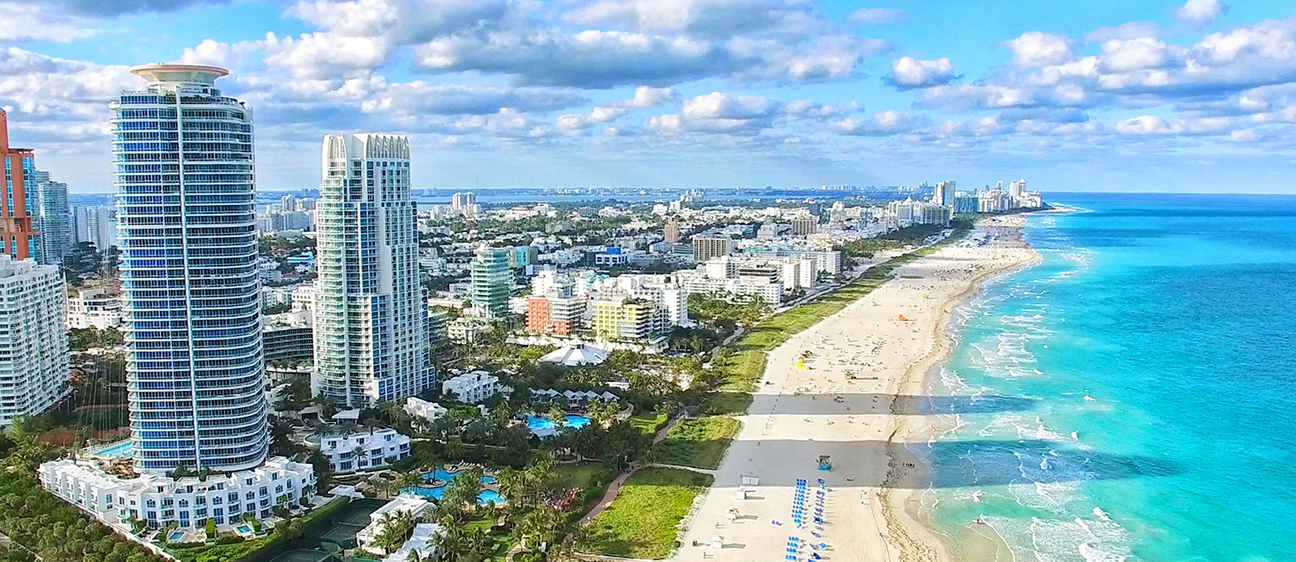Thinking about buying or selling in Miami Beach and stuck between a condo and a co-op? You are not alone. Both can look similar from the outside, but what you own, how you finance it, and your day-to-day control are very different. In this guide, you will learn the key differences that matter in Miami Beach, including ownership, financing, insurance, inspections, rentals, and a practical due-diligence checklist. Let’s dive in.
Condo vs co-op: what you own
In a condo, you own your unit as real property along with an undivided share of the common areas. Florida’s Condominium Act sets the rules for how associations operate, disclosures, reserves, and governance. You receive a deed at closing and standard title insurance applies. You can read the legal framework in Florida Statutes Chapter 718.
In a co-op, a corporation owns the building and land. You buy shares in that corporation plus a proprietary lease that gives you the right to live in a specific unit. The Florida Cooperative Act governs this structure and the co-op’s bylaws and lease control your rights and obligations. You receive share certificates rather than a deed. See Florida Statutes Chapter 719 for the statutory framework.
What this means for you: condo ownership is fee simple and familiar to most buyers and lenders. Co-op ownership is a share-and-lease relationship with different transfer documents and board control. If you are considering a co-op, involve a local title attorney who has handled Miami-Dade co-ops.

Financing and resale in Miami Beach
Condo financing is widely available. Conventional lenders, and in many cases FHA and VA, will lend on condos that meet program standards. Projects often need to satisfy criteria like owner occupancy, reserves, insurance, and litigation status. Review the federal guidance for condos through HUD’s condominium project approval resources and Fannie Mae’s project eligibility standards.
Co-op loans are different. Lenders typically make “share loans” secured by your shares and proprietary lease, not a mortgage on real estate. Fewer banks offer them, underwriting is tighter, and down payments are often higher. FHA and VA programs center on condos, so co-op eligibility is more limited. Always confirm current options with a lender that regularly finances South Florida co-ops.
When it is time to resell, condos generally have a larger buyer pool in Miami Beach, including investors and second-home buyers. Co-ops can take longer to sell due to financing limits and board approvals. In short, condos are typically more liquid in this market.

Rules, fees and approvals
Condo associations set budgets, make rules, and provide resale certificates and estoppels at closing. Many require buyer applications, but they do not usually conduct in-depth interviews or review your finances like a co-op board might.
Co-op boards often require full applications, financial statements, references, and an interview. Boards can approve or reject buyers based on their criteria. This gatekeeping is a major difference in how ownership feels day to day.
Monthly costs also vary. Condo assessments cover common areas, some utilities, a master insurance policy, and reserves. Co-op maintenance fees often include similar items and may also include the building’s underlying mortgage and property taxes. That can make co-op fees look higher even when total monthly costs are comparable.

Rentals and short-term rules in Miami Beach
Rental policies are set by your association and the city. Many Miami Beach condominiums allow rentals with rules on lease length, frequency, or waiting periods. Co-ops are more likely to restrict or prohibit rentals.
Miami Beach also regulates short-term rentals. Before you plan on vacation rentals, you must confirm both your association’s rules and city law. The city provides guidance on short-term rental requirements and enforcement. Failing to follow local rules can lead to fines, so verify before you buy.

Insurance and building risk in Miami Beach
Hurricanes, coastal flooding, and rising insurance costs are a core part of the Miami Beach equation. Associations typically carry a master policy for the building and common elements. As an owner, you should carry an HO-6 or similar policy for your interior finishes and personal property, plus loss assessment coverage. Co-op shareholders should carry comparable interior coverage as required by the proprietary lease.
Flood risk matters. Many Miami Beach properties sit in FEMA flood zones. Flood insurance is required by most lenders and is widely recommended across the city. Check your location on the FEMA Flood Map Service Center and learn how coverage works through the National Flood Insurance Program. Budget for premiums and understand deductibles, especially windstorm deductibles that can be substantial after a storm.
Building health is also in the spotlight. Miami-Dade requires periodic building recertification and structural inspections for aging buildings. Since the Surfside collapse, scrutiny of engineering reports, reserves, and major repairs has increased. Review the county’s program to understand requirements and timelines on the Miami-Dade recertification page. For older buildings, ask for recent engineering reports, reserve studies, and a history of capital projects.

Taxes, closing costs and documents
Most condo owners are billed directly for property taxes on their units and may qualify for homestead exemptions when eligible. Co-op tax treatment can differ because the corporation owns the real property and shareholders hold leases. Always confirm with the Miami-Dade Property Appraiser and a local professional.
Closing costs apply to both structures, including transfer fees, title or legal fees, stamps or recording charges, and association fees. Who pays what can vary by contract and local practice, so have your title company provide a closing estimate.
Key documents to review:
- Condos: declaration, bylaws, articles, budget, reserve study, financial statements, meeting minutes, insurance summary, litigation disclosures, rental rules, resale certificate, and estoppel.
- Co-ops: articles and bylaws, proprietary lease, financials, corporate minutes, shareholder ledger, maintenance schedule, insurance policies, any building-wide mortgage documents, and board approval procedures.

Who should consider each?
Condos often fit buyers who value flexibility, easier financing, and broader resale options. Investors and second-home buyers tend to prefer condos due to rental potential and familiarity with fee simple ownership.
Co-ops can suit long-term owner-occupants who value a more controlled community and are comfortable with board approvals and stricter rules. Co-ops may price lower in some cases, but always compare total monthly costs and the impact of rental limits on your plans.

Due-diligence checklist for Miami Beach
Financial and governance
- Current budget, recent financials, and reserve study
- Regular assessments, special assessments, and reserve funding details
- Master insurance summary, including wind and flood coverage and deductibles
- Any pending or recent litigation involving the association
Building and safety
- Latest engineering and structural inspection reports
- Proof of Miami-Dade or City of Miami Beach recertification compliance
- History of major projects like roof, facade, waterproofing, garages, and how they were funded
Occupancy and rules
- Owner-occupancy rate and leasing rules, including any waiting periods or minimum lease terms
- Short-term rental policies and alignment with Miami Beach short-term rental rules
Title and transfer mechanics
- For condos: title commitment, resale certificate, and estoppel
- For co-ops: share certificate review, proprietary lease, corporate records, and board approval process and fees
Financing and taxes
- Lender pre-approval and confirmation the building meets HUD or Fannie Mae standards as needed
- Property tax treatment and potential exemptions confirmed with the Miami-Dade Property Appraiser
Risk and insurance
- Flood zone determination via the FEMA Flood Map Service Center
- Quotes for HO-6 or co-op equivalent, flood insurance, and estimated windstorm deductibles
Practical moves
- Speak with one lender experienced in Miami Beach condos and one who does co-op share loans
- Read 12 to 24 months of meeting minutes for transparency on upcoming projects and assessments
- Have a local real estate attorney review co-op proprietary leases and corporate documents
Next steps
Choosing between a condo and a co-op in Miami Beach comes down to how you want to own, how you plan to finance, and how much flexibility you need for renting and resale. With the right due diligence on insurance, inspections, and association health, you can move forward with confidence.
If you want a clear, side-by-side evaluation of a specific building, or you are planning a sale and want to position your unit for the strongest outcome, let’s talk. For expert guidance and a data-informed strategy, connect with The Kotelsky Group. Get a Free Home Valuation Today.
FAQs
Which is more common in Miami Beach: condos or co-ops?
- Condos dominate the market in Miami Beach, while co-ops make up a smaller share of available inventory.
How does financing differ for condos vs co-ops in Miami Beach?
- Condos typically qualify for conventional and sometimes FHA or VA loans, while co-ops use share loans with fewer lenders and stricter standards.
Are co-ops cheaper than condos in Miami Beach?
- Not always. Co-op prices can be lower, but higher maintenance fees and a smaller buyer pool can offset pricing differences, so compare total monthly costs.
Can I rent out my condo or co-op unit in Miami Beach?
- It depends on your association and city rules. Many condos allow rentals with limits, while co-ops are often stricter. Always check Miami Beach short-term rental rules.
What insurance should I plan for as a Miami Beach condo or co-op owner?
- Confirm the association’s master policy, get interior coverage, and budget for flood insurance and windstorm deductibles. Review your flood zone on the FEMA map portal.







